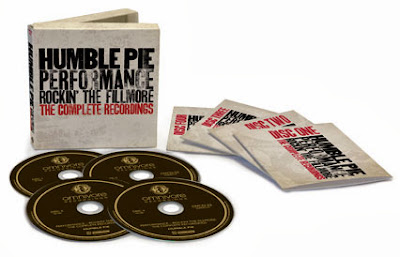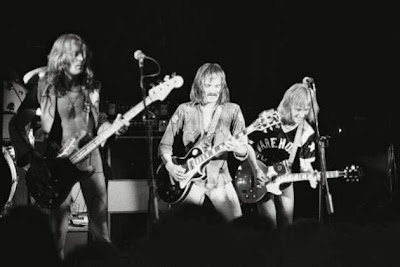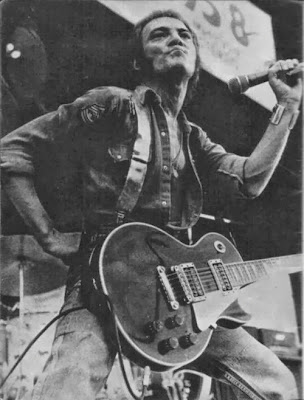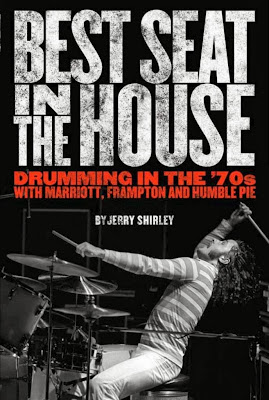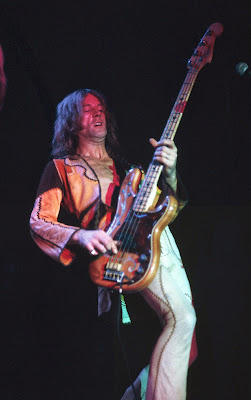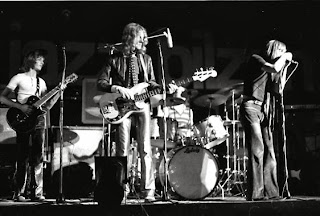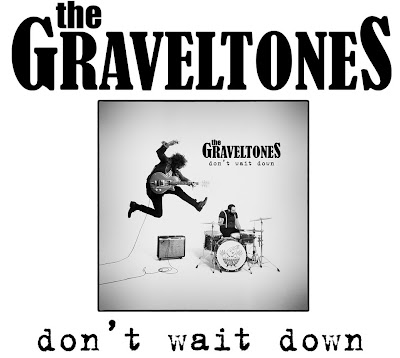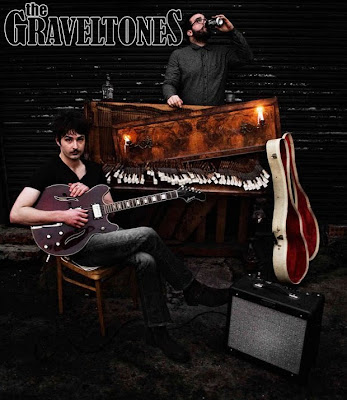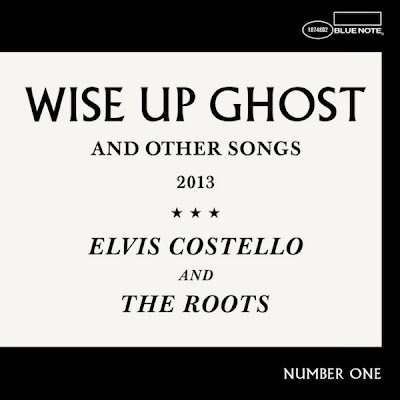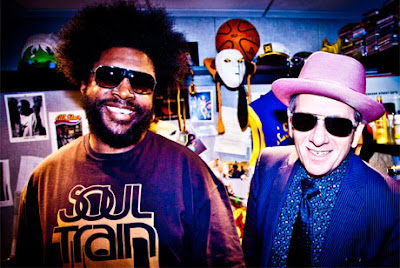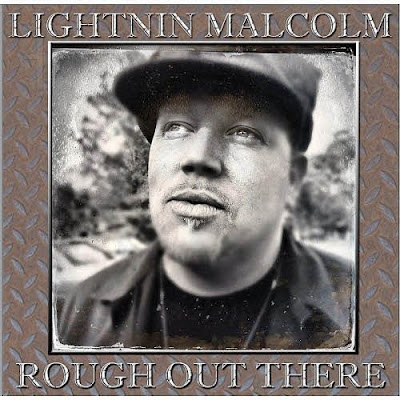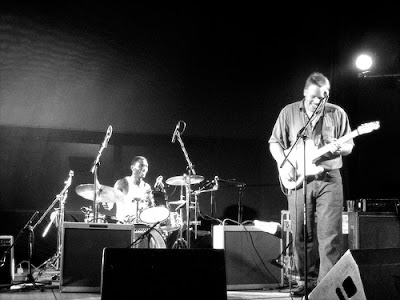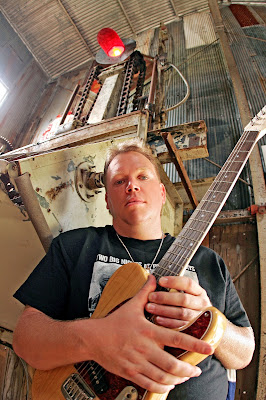Monday, September 30, 2013
The Temperance Movement - Saving Rock 'N' Roll, One Song, One Show At A Time
The Temperance Movement is fronted by Phil Campbell, and he has it all - he sings like a lost remnant from Carnaby Street circa 1968, he writes like he's lived a life that hasn't always went his way, but made for great stories, looks like a movie star, and has surrounded himself with a wickedly divine band of rock 'n' rollers. The band has just released their debut album, and it's an automatic for the inevitable year end top tens - a killer record.
The band is straight up, straight ahead, and what you see is what you'll love. Exuberant guitars gush out of the speakers as their frontman tells his tales, and the rhythm section pushes and pulls just right - no click tracks in sight, no this bunch sounds like they set up, laid it down and headed back to the pub for another set. Tasty riffing is the order of the day, and the production is as crisp and clean as a summer morning. Great guitar tones are to be found from stem to stern, and I'm not really looking for one, but they have not a chink in their mighty armor.
When the opening chords of Only Friend come lurching out of your speakers you're going to smile - trust me on this. Pungent chords on the left, tasty fills and leads on the right, the guitars could not sound more right as they provide the platform for Campbell's soul drenched voice. It's so thrilling for me to hear a guitar team playing off of, and against one another with such grace and style - Paul Sayer and Luke Potashnick listen to one another, that is very evident, and they create a tapestry of rock that brings great joy to my heart.
Ain't No Telling is dirty and biting, as the guitars kick up the grit, the rhythm section digs in, and an unholy combination of The Stones and AC/DC isn't beyond the imagination. Campbell sounds like he's being chased by the devil, his demons, and every angry woman he's ever crossed.
The band steps off the gas a bit on Pride, as their singer weaves a tale of love gone wrong, chapter 999. Nothing new, but it's seldom done this well - rock balladry that would not sound out of place on one of Rod's early solo efforts. Nick Fyffe's bassline is sublime as he pulsates in and out of the verses with subtle fills and rock solid walks up and down the neck - taste, taste, taste - I'm going to keep saying it, as this material just drips with it. The guitars finally step up, Damon Wilson kicks his kick drum into gear and the whole thing soars into the blissful heavens of rock.
Chunky chording rings in Be Lucky, and it brings to mind the best of rock Atlanta style, as the band evokes thoughts of The Black Crowes and Georgia Satellites - strong song craft joined by - yes, tasty rock from wall-to-wall. No wonder my UK friends are telling me that this bunch is saving rock and roll one show, one song at a time.
The speed kicks in with a fuzzed riff and a double time beat as Midnight Black comes bouncing off the walls. Dance hall rock of the nth degree, as Campbell sounds like he's struggling to keep up with his band, and running as fast as he can to get out ahead of the chapter of verse he's expounding. One can only imagine the excitement this one provides in a live setting.
The Temperance Movement respects rock history - you can hear the lessons in the grooves, the changes, and their sumptuous melodies. Chinese Lanterns is country via the UK, and it's as sweet as early Elton John - Campbell has tremendous skills in the ways of phrasing, vibrato, and passion. He never sounds false, it all sounds like it straight from his heart onto his sleeve.
The boys get rootsy on Know For Sure - the riffs get swampier, but Campbell keeps it between the white lines with his Marriott inflected howlings. Again, the two guitars continue their joust with some sweet slide stylings meshing nicely with the jagged, plucked chord work. When the slide solo kicks in, some crazy cool counterpoint commences, and the guitars steal the show, if briefly.
Heavy riffing commences with Morning Riders - this one is almost Zep-ish in it's groove. This reminds me of Michael Des Barres best days with Silverhead in the mid-70s. One foot in the blues, on foot on the pedal. The chorus is as catchy as everything else on display here, and Phil Campbell shares the spotlight, and plays well with others.
Strummed minor chords always capture my heart, mind, and spirit, and Lovers And Fighters is sublime - when you can make one of these ballads work this well, you have earned your stripes. That high lonesome note that hangs over a backbeat and a bassline is sweet as tea on a July evening. Graham Parsons meets Keith somewhere after midnight.
The drums swing out on Take It Back, and the war whoop vocals are perfect, as is the loping bass figure that Fyffe weaves through the tune. These fellas know high style, and they ease in and out of minor genre shifts like they've been doing it for decades. No wonder this band is bold enough to let a powerhouse outfit like The Graveltones open their shows - they're fearless, and they know it.
Smoldering is a smoky piece that is slower than molasses, and twice as sweet. The soul of Ronnie Lane seems to be hanging over the best of the UK these days, as the ghost of The Faces watches over. Did I mention that Campbell has the voice of a devilish angel?
Tremolo guitar to end an album? Yes, please - this late in the set I can almost hear the tubes cooking in the back of the amps, as the boys wrap up the record and put it to bed. Serenity finds Campbell finally finding his peace, and he's earned it with this, the performance of a lifetime. What a nice way to set sail into the sunset.
The Temperance Movement are what I've termed 'a band of hope.' I've set forth on a mission that goes by the name of Rock Ain't Near Dead™, and as long as there are great debut albums by bands as great as The Temperance Movement, indeed, rock ain't near dead.
God bless The Temperance Movement.
https://www.facebook.com/TheTemperanceMovement?fref=ts
Pre-order here!
http://www.thetemperancemovement.com
Humble Pie - Performance - Rockin' The Fillmore: The Complete Recordings - Prepare To Be Amazed
"My God, it just took my breath away," Jerry Shirley says. "You feel like you're setting in the Fillmore East, five or six rows back. In the quiet bits, you could hear a pin drop, and in the loud bits, you can almost feel the room shaking."
Peter Frampton adds, "It's like a breath of fresh air after listening to one particular version. The beauty of it is that you get three other completely different performances of most of the songs.. And it's great to hear Steve's banter from all of the shows. We've lived with, (imitates Marriott) 'It's been a gas!' for 40-odd years, but now there's more!"
I'll admit to having been intrigued and excited last winter when I first heard that Peter Frampton and Jerry Shirley were going back into the vaults to revisit their classic 1971 live epic, Humble Pie - Performance - Rockin' The Fillmore. What I didn't expect was to be saying a year later that this might be the best sounding live document of a rock show that I've ever heard. But it's just that - the two surviving members of one of rock's greatest road shows have put together amazing evidence with which to proclaim Humble Pie as one of the best live outfits to ever tread the boards.
Recorded on two nights with two shows per evening on May 28 and 29, 1971 at the world renowned Fillmore East, Performance - Rockin' The Fillmore captures all four shows from beginning to end unabridged, which is all the more, given frontman Steve Marriott's rants and charming ravings between tunes. I've always considered the original album to be one of the seventies best live long players, but when I hear the unbridled aggression of the Marshall amps and the howling Les Pauls, the crisp clarity of the vocals, and the incredible rhythm section of Jerry Shirley and bassist/vocalist Greg Ridley, I am astounded to discover what I thought very good turns out to be very great - very, very great.
People often think of Humble Pie as Steve Marriott's band - the diminutive shouter indeed projected a larger than life facade, and had more than enough chops, chutzpah, and star quality to command that possibility, but in reality, the band was born from the desire of Peter Frampton to be taken as more than just 'the face' of British pop. After Marriott recommended the young Jerry Shirley for the drum seat, he found himself in a similar situation, having just left Small Faces, and seeking a new platform for his bristling skills - he asked Frampton for the gig, and the guitarist immediately approved. Drafting Greg Ridley was a stroke of prescient genius, as the bassist not only fit with Shirley like a glove, he also could sing as well as he played, and he played well. If you haven't, I would greatly encourage you to pick up a copy of Jerry Shirley's excellent 2011 book, Best Seat In The House, one of the truly great rock 'n' roll reads - it's often not an easy read, as Humble Pie's story is fulfilled by the phrase, 'Everything that was good about it, was everything that was bad.' But before excess and road stress took them down they shone like the sun itself.
One of the greatest joys of this package is the revelation of just how diverse and accomplished Humble Pie were at a variety of styles and guises - everyone knows their brutal British blues rock savagery as revealed by such hits as I Don't Need No Doctor, but when you hear the various versions of Mac Rebennack's I Walk On Gilded Splinters, the Pie is revealed to have ample doses of psychedelia, soul, and Yardbirdsian guitar histrionics in spades - while this should serve to end all arguments of Frampton's six-string greatness, it also displays what a great guitar team he formed when he accepted Marriott's offer to join. Peter's style is surely in development at this point, and it's a gas to hear his buttery, fluid style emerging from a more 'go-for-the-throat' approach. Another joy is the realization that there were several great singers in the band, and whether harmonizing or trading verses as on their tradition show opener, Four Day Creep, it's a joy to hear the band tossing the ball around as Shirley keeps things glued together with his combination of hard as a hammer backbeats, and his more musical moments on trips across the toms and cymbals.
By the time the original album was released in November of 1971, both Frampton had made his exit from the band to head for solo success, and The Fillmore East had shuttered its doors. It's our good fortune that the tapes from all four nights are in tact - whereas with some bands, you might get stock arrangements and little variation, Humble Pie majored in adventure and invention, reinventing arrangements and turning cover tunes into their own with Marriott's fly by the seat of your pants approach to performing. From Tim Cohan's fantastic liner notes:
"The fact that nothing from the first show made it to the original album wasn't because the band's performance wasn't of the highest quality, Shirley explains. 'The engineers were getting the sounds during the first set,' he says. 'You can do all the run-throughs you like, but until you've got the audience in there, you're never going to get it sounding the way you need it.' The new mixes (by engineer Ashley Shepherd) done for this release have quashed out any audio kinks that may have been present on the tapes of the first show, proving the extraordinary consistency of Humble Pie's commanding playing, singing, and presence."
Yet another bit of the great fun with this project is going through the tunes one by one and hearing different guitar solos, vocal utterances and phrasings, and the sound of Humble Pie inventing their take on the concept of the jam band. Frampton and Marriott's guitar playing is like night and day, but that is much of the beauty - it manages to cross the threshold of the blues and the burgeoning world of hard rock with equal aplomb. One wonders what may have become of this bunch in the absence of cocaine and excessive touring hadn't eventually weakened the bonds that brought them together. There are no shoulda, coulda, wouldas in seventies rock, though, and we're incredibly fortunate to have what we have as evidence of just how high the watermark was in those heady days. Humble Pie was amongst the first of the rock supergroups, and this package makes the case brilliantly.
I am personally very grateful that Peter Frampton and Jerry Shirley decided to take the plunge and issue this release. To my mind, it stands ably and proudly next to The Who's Live At Leeds, and The Rolling Stones Get Your Ya Yas Out as definitive live albums of the era. Frampton made his name with a tremendous live album, and now he can be proud of the fact that his name features prominently on two of the greatest live albums in rock history. When you hear this, you will be amazed - as Shirley says, it does place you in the best seats in the house, and what you're hearing is really even better now that the tapes have been sorted out and maximized.
Four Day Creep - on all four nights it opens the show, and bassist Ridley takes the first verse amongst swaggering guitars and rhythm thunder from Shirley and Ridley's soulful bass playing. Shirley never got the credit due him as a stickman, and his work here drive the band with power and precision - it's no wonder Bonham loved him so. Ridley passes it over to Frampton for the second verse, and while he's not as silken as in his days as a solo star, the roughness of his voice aligns perfectly with the slashing solo that goes down before Marriott steps up to take down the roof, which he does on all four nights.
Marriott's impassioned singing/shouting is matched step for step by Frampton's stinging blues fills that introduce the Willie Dixon classic, I'm Ready, but the band owns it, rearranging the riffs and slamming through the arrangement with abandon and very pure rock 'n' roll joy. Frampton takes the second verse, and he's bolstered by Steve Marriott's primal rhythm riffing. Anyone who ever thought Frampton to be a soft rocker needs to eduacate themselves, and there could be no better place than here - when he staggers skipping through his solo, it's in the same school, and from up the same alley as Page's in the same period. Rock mastery on all fronts - it gets little better than this.
Dr. John recorded I Walk On Gilded Splinters for his first album, but he couldn't have imagined this arrangement - listen close and tell me on which night you can hear the empty liquor bottle roll down the aisle before the drums and bombast arrive! Frampton calls this tune the band's thesis, and he's right. This is huge arena rock mixed with soul, the blues, some psychedelic sprinkles tossed about, and tremendous instrumental interplay throughout. At over 26 minutes every night, this tune alone supplies the listener with more than an hour of ample evidence as to why one would call Humble Pie one of the best live acts in rock 'n' roll history.
Hallelujah (I Love Her So) features the two guitarists trading verses again, and when Ridley joins in the band has as much vocal fire power as they do instrumentally, and their power is prodigious. One wonders what Ray Charles must have thought of this arrangement of his work - I'm guessing Brother Ray dug it.
I Don't Need No Doctor closes out the set, and as the last song of a four night stint it truly shows the band at its best - sheer confidence with every note, every beat. Humble Pie knew exactly how hot their flame burnt, and I can only imagine how much adrenalin was flowing as they wrapped up their stand - Frampton and Marriott attack their axes with ferocity, Shirley hits the kit like he's trying to go right through the heads, and Greg Ridley is always pumping out basslines that suggest just how much Motown and Stax he was listening to in those days.
On Rollin' Stone serves to remind me why I voice displeasure at so much of today's blues rock - this has more fire and passion than a herd of pentatonic SRV worshippers on their best day. The band takes the Muddy Waters classic straight to a sweaty soundcheck filled with cranked hundred watt Marshall full stacks and screaming Gibsons.
Stone Cold Fever is the only band original featured on either night, coming off the band's Rock On album, and it's molten metallic rock that set the stage for later riff rockers like Montrose, who surely must have studied this closely. Humble Pie were regularly opening tours for bands like Grand Funk Railroad, and more often than not decimating the competition with their sheer audacity and mastery of the form.
As I said, much of the joy involved here is being able to sort through different versions and being amazed at the band's ability to approach each night a little differently while working from the same format - the rhythm section of Jerry Shirley and Greg Ridley provided a huge platform from which Frampton and Marriott could display their talents to the fullest without worrying about where they would land when they descended. Humble Pie was a formidable four-headed rock monster, and once again, Frampton and Shirley deserve all due credit for allowing this to see the light of day in what I believe to be the absolute best fashion - were all reissues and compilations done with this much passion and elegance, it would be a beautiful world.
http://www.amazon.com/Performance-Fillmore-Complete-Recordi-Humble-Pie/dp/B0098OED5M
Monday, September 16, 2013
Jonny Lang - Fight For My Soul - The State of Soul Music 2013
There's little better than to be greeted on a Monday morning by a record that completely overturns the coffee cart, and kicks you square in the tail.
Fight For My Soul by Jonny Lang is one of those records - don't make the mistake of thinking that Lang is just another wannabe blues rocker, no, he's long since moved on to serious and sophisticated rocking soul that evokes the best of Marvin Gaye, Prince, and yes, even the pop wizardry of Michael Jackson. Not just a record, this is an achievement.
Did I just write that? Yeah, I did, and I'll build my case, but let me start with his singing - every song here is drenched with Lang's excellent sense of soul, melody, and passion. There's no walking through the tunes, he's putting his soul on the line with every cut, and making the mark and often greatly transcending it. Then there's also tons of great guitar work, and a production that harkens back to the days of big budgets and dreams. This record is one expansive son of a gun - it covers a lot of ground, but Lang always sounds like Lang, he's definitely found his voice.
This is Lang's first studio outing in seven years, and it sounds like he spent the whole time working on his songwriting, singing, and record making chops - fighting for his soul? It sounds like the war is being waged and won. His singing on the title track covers a lot of ground, from a whisper to very healthy belting, and back. This picks up where R&B got lost in the late '80s, when skills gave way to drum machines and infantile loops. I also like that albums are getting back to reasonable lengths - 11 songs are a manageable dose.
Calling Jonny Lang a bluesman is now the way of rapscallions who put pen to paper without first listening - he's graduated to that lofty altitude in which he can be called an artist. The bluesy riff that kicks things off on Blew Up is about the bluesiest thing on the record, and less than a minute later we're into a melodic mashup of big pop and rock that is fantastically catchy - if this was 1985, they would have spent a cool million on the video. He blows up the house, burns it down, and walks away smiling. The bridge goes to Minneapolis via London, sounding like Prince joining Foreigner (when they had it). A fiery guitar solo reminds us that he's a six-string strangler, and then it's back into the chorus for a sizzling end. The drums, bass, and Dwan Hill's keys are on fire, as well. It sounds like everybody played like their lives depended on this one.
Breaking In is modern soul done right, with marching drums, slick strings that give way to a thumping and swaggering stomp. The songcraft is killer - sections come and go with a cohesion that suggests lots of time spent thinking about outmoded things like arrangements, and production. The keyboards are layered on very heavily, and they're wonderful - whether it's some tinkling piano, or string and synth washes, they are spot on.
Some skronky wah guitar announces We Are The Same, and we're in the territory of '70s soul, circa Curtis Mayfield and his classic, urban tales. Sophistication is on tap in spades here, as big cascades of female vocals take over, only to be taken over by big Philly sounding strings and electric pianos that are perfect cushions for Lang as he applies his husky baritone to the tale. James Anton's rumbling bassline drives the chorus as things get bigger and bigger - it's great to hear such expert use of dynamics and drama. Another very cool bridge pushes us into a furious guitar solo that gets pushed too and fro by a slamming bass and drums interlude - Barry Alexander's drum playing is a marvel across the whole of the record. Hit after hit, kids....
One of the great things about this record in the fact that for all its intensity, it still manages to breathe. What You're Looking For combines solid soul songwriting with some modern production touches as Lang's vocals dance around the band and some fabulous background vocals that are placed strategically through the mix - when the chorus gets there, the whole thing is as wide and beautiful as the Grand Canyon. Lang never gets into the trap of cliched guitar parts - his parts are always right for the song, and there's no lingering blues rock boredom to be found.
Not Right walks in on a pad of acoustic guitar, but soon gives way to another slab of soul - this is deep in the tradition of social analysis via rhythm and rock. Lang's vocals are all over the place as he dips in and out of husky voicings and flutier falsettos. This takes the direction that I always hoped guys like Prince and Terence Trent D'arby would take - the soul is served properly, but the rock is heavier and more present.
The Truth is a builder - it comes in with pinched single string guitar notes and a bed of piano as Lang unfolds his tale of dependence in love. By the second verse, the drums are a heavy presence, as Lang does great work combining his vocal with some very tasty guitar work - Very pop. very much in the vein of the love ballad hits of Cheap Trick. That may sound almost blasphemous, but get over it - Rick Neilsen and Robin Zander owned that stuff, and it is tremendous ear candy. Lang has written a great song, sings like a man possessed, and plays great guitar - nothing to it, right?
Jonny Lang is following his muse - it's easy to hear as he goes from song to song here, and River is another cornucopia of styles that meld together like the best french recipe - you see an ingredient go by and you smile in acknowledgment, and it's off to the next. His solo fairly bounces off the wall, as he kicks the level of his vocal up a notch, or two, before settling into a ride out that is rich in female backgrounds, guitar squalls, and a drum track that is marvelously relentless.
The title track, Fight For My Soul, is a vocal tour de force. Sounding appropriately vulnerable, Lang lets the song unfold at a slow, easy pace that gently builds with some nice unison guitar bends, and a pulsing bass and drum routine that speaks volumes about the respective players taste and skills. Things get louder when a spiky organ joins the mix, the bass swoops and dips, and our young hero jousts with voice and guitar. He's fighting for his soul, but in such a classy fashion that we're never anything but sure that he's not going to win, he's won.
All Of A Sudden is straight early seventies balladeer, and he gets it perfect. Another huge vocal victory - is anyone singing like this on a regular basis in 2013 - maybe only my pal, Glenn Hughes, and maybe Richie Kotzen are singing quite this spectacularly. Layers upon layers of voices, melodic synth that reminds me of the days when Stevie Wonder had his hands on his Arp and Moog synths - yeah, it's that good. Maybe the vocal performance of the year.
I love big and great production - I enjoy hearing musicians stretching and testing their skills - Lang and co-producer Tommy Sims obviously spent a huge amount of time painting this masterpiece. Seasons is a perfect example - epically drawn out, it goes many places you don't expect in its cinematic journey. The strings literally take on various personas - the last album I heard that had great strings was Sonny Landreth's Elemental Journey last year, and I understand that it's a grand adventure to commit to the cost of strings, let alone to taking the time and diligence to make them adventurous, and well thought out. Much of the sonic play at work here suggests European psychedelic music of the early seventies, and movie soundtracks. And, on top of it, Lang has written another great song in which to immerse in the ocean of aural glory.
Jonny Lang obviously took his time and has reached deep into his psyche to construct this album - I'll Always Be is a slow drifter of a tune that gently carries the album out to sea, and we see that one time prodigy has matured into the complete package. When he takes his final solo of the record, his guitar is joyfully joined by his voice, and he really could not have gotten it any better than he does.
Fighting For My Soul is a great record. Jonny Lang - I hope he gets the listeners he deserves with this album. I will say that I never expected to hear something like this - this pops right into that rarified atmosphere I consider to be artistic greatness. A huge accomplishment.
http://www.jonnylang.com
https://www.facebook.com/JonnyLang
https://twitter.com/jonnylangband
Tuesday, September 10, 2013
The Graveltones - Don't Wait Down - Flippin' Brilliant
"Forget Batman and Robin. The Graveltones are The Dynamic Duo for the 21st century. Jimmy and Mikey deliver the most exciting, musical, and texturally compelling sounds of any duo I've had the pleasure of listening to (and jamming with) in a very long time!" ~ Elliott RandallMy problem with most duos is the fact they're often not great players, singers, or performers. In fact, that's been my gripe with shitloads of rock for way too long, but the tide is turning, and The Graveltones have shown me the light - these guys have mad skills, they write catchy rock, play their asses off, and what do you know, the guy can even sing.
That guy is Jimmy O, who handle the guitars and vocals, and he's driven to his madness by the thunderous, but precise bashing of drummer Mikey Sorbello. They're creating a hell of an effective stew - I'm hearing some Zep, a boatload of T. Rex, and even some early G&R, and that's just in the first tune, Bang Bang. O is a wicked six-stringer, he manages to carry the show with fat, aggressive riffs and inventive pointed soloing. He also has great pipes - he swoons and sweeps in and out of song sections, and always returns to a solid, gritty baritone that jumps out of the mix.
Bang Bang leads off, and the die is cast - a brutish riff kicks things off, and O is immediately throwing down righteously loud rhythms and weaving a melody over the top that delivers on the promise of the Bowery's best rockers from the seventies. Johnny Thunders may have sounded this good had he laid off the junk, but when this pair go into the best breakdown since Aerosmith's first record, the train just keeps a rollin'. This is half big city, half rootsy-rockin' blues madness with some incredible flourishes that go glam.
These two Australians didn't know one another when they landed in London and fell into a jam that lead to instant gigging, but they sound like they're connected at the hip musically - Forget About The Trouble is over too soon, with it's tight unison guitar and vocal riffs - Jimmy O has heaps of star quality, and he takes great command of every moment as Sorbello not once allows things to slow down.
Big beat rock - this stuff sounds huge, and while it starts off lo-fi, the bass drums and hi-hats instantly thrust Dying On Your Feet back to a time when drums sounded huge, precise, and as they should. The footwork here is astounding, and O is fabulous at coming up with one great riff after another, and then he takes a one note solo that leads into an end of times interlude that then goes into some calliope craziness before returning to the brontosaurus beat - Classic Rock Magazine got it right when they called this bunch one of the best new bands of 2013.
St. Lucia sounds like what I always wanted The Stooges to sound. Punk as fuck, but with a sense of style and precision that Iggy's lot could never really muster. This sounds like a Coltrane blast set to rock, and sent down to the infirmary. Again, I hear a similarity to the days when Steven Tyler had such a command of his genre - this has all the swagger, and an updated structure that is very today. When the pair go into the breakdown there's some otherworldly vocals weaving around the big beats, and then O unleashes a whammy-infused solo that is out but in.
This pair sound like no one but themselves at the end of the day - I make comparisons so you can hear what I'm writing to - that's the best way I can find to communicate the wonderful noise going on here. Money is a tune that makes the case - both musicians are playing leagues above much of what I hear from day to day, and with an originality that makes me smile. Even when they're being experimental, they are still engaging and keeping my attention front and center.
Crime To Be Talkin' is a cinematic tale that starts slowly, cleanly, and as the story gets more involved so does the music. Sorbello is a master of mixing it up - he's hitting everything in sight, and all at the right time - when the guitars get loud and Jimmy O goes into some of his farthest reaching vocal gymnastics of the album he lays back into a big backbeat that fits perfectly. Dynamics are on the menu, and The Graveltones are steeped in the art.
Lightning Bolt is a full out rocker that sounds huge, but not too covered in mush, or in any way shrill or harsh. O's guitar tones are filthy and full, but still well defined and unobtrusive. His solo is straight from the good book of Jimmy Page, and I gotta think the master would be pleased. Fuzz has never sounded better, and his playing is as on point as his tones. Thrilling.
Dulcet keyboards ring in I Am A Liar, and O is singing from behind a bit of time-shifted distortion that keeps things somewhat psychotic - half Ian Hunter/half Alice Cooper? A great piece of songwriting. Nothing else on the album sounds like this, and I can't wait to hear more, though I'm not even through with the debut.
You're No Good is heavy as hell, with some more great drum work, and vocal tricks that you're not expecting - they never quite play it straight and take the easy way out, they tweak, twist, and turn everything around to keep it exciting - a huge success.
A bit of rock-a-billy madness jumps out on Catch Me On The Fly - the guitars are gritty and dirty, but this still manages to swing like mad as Mikey Sorbello again takes command of the rhythmic thrust. I keep forgetting that this is a two piece, and that's amazing - they never fall into a rut, and they keep coming up with hook after hook after hook.
Never Going Back is another dime store detective novel type tale that jumps from genre to genre as the drums, vocals, and guitars all compete for attention. Slick production ideas come off well as voices and choirs come and go while the exuberant rock flows like molten lava into a sinister section that gets swept away by a big rock ending.
Epic ending? Sure, why not. Six Billion gets the slow setup before some noise bombs start going off through the mix - it's suspense at its best, and when Jimmy O lays out the tale amongst the ruins, he's walking through an arrangement that leads straight into rock 'n' roll Armageddon. This is a great ending as it restates the records various premises, and leaves me wanting to hear a bunch more.
Rock Ain't Near Dead - it's become my mantra, and I've never been more sure. The Graveltones certainly made that clear this afternoon. Run out and buy this one - it's out October 21 on Lagoon Dog Records.
http://www.thegraveltones.com/
http://www.facebook.com/thegraveltones
http://www.twitter.com/graveltones
Monday, September 9, 2013
Elvis Costello and The Roots - Wise Up Ghost - Collaborative Cool
Just last week I was looking at the new signature Gibson SG commemorating The Root's guitarist Cap'n Kirk Douglas, and as I watched him playing some slinky, suggestive chords on said instrument, I mentioned to a friend that I knew little about the band, but had planned on checking them out for some time.
No sooner was this said than Wise Up Ghost, the new album by Elvis Costello and The Roots landed upon my table, and I am an instant convert - Costello is brilliant as always, and The Roots sound like they've digested most of the soul music that's been made for the last sixty years, and given it their quirky and much more than competent update. If you had played this for me in 1978 and told me it was what Costello would sound like in 35 years, I'd have been most pleased.
The concept emerged after repeated jam sessions spurred by Costello's appearing on the Jimmy Fallon show - at some point they realized that they had an album in the works, and indeed, they do. Wise Up Ghost is a welcome addition to a year that has been surprisingly potent in new releases.
The Roots are more urbane and less spastic than were The Attractions, but there are soulful similarities, as I can hear echoes of Motown, Philly, and Stax in the grooves here. Especially noteworthy is Questlove's drum work, which gets him a seat next to names like Purdy, Al Jackson Jr., and Earl Young, as a hall of fame worthy stickman. In fact, though, the entire band is solid as a rock, and smooth as silk. It's easy to see how Costello envisioned his busy word play and subtle melodicism working so well in this setting.
Walk Us Uptown sets the tone as a pastiche of electronics announce the intro - Questlove's tight, high hat driven beat instantly gets things moving as period perfect keyboard swirls take me back to the days of Was (Not Was), Cap'n Kirk's comping is mated to the drums like newly weds, Costello brings in extra melody for the chorus, and this is the E's best collaboration since Bacharach. Sophisto-pop at its best.
Retro meets modern as some early '60s strings ring in Sugar Won't Work, and then there's some Motown approved single low string guitar statements that bring in the king, and again, he's killer on the choruses - this is Southern fried soul mixed with Carnaby Street meeting in 2013, and they walk the dinosaur. The Roots remind me of this season's Daft Punk as they explore the past, then drag it sweetly into the future. Kamal Gray's keyboards are fabulous throughout, and on this cut he provides some amazing organ work, swirling, punching, and coaxing Costello. Do they quote The Age of Aquarius at the end? Maybe.
Skronky clavinet signals the entry of Refuse To Be Saved - this evokes thoughts of Dylan gone hop, and it's again, just fucking brilliant. You can almost hear the fun for everyone in the grooves - Mark Kelley's expanded range bass walks wonderfully, at one moment percolating, then supplying great melody. This is the first track that sounds like Elvis is joining The Roots as opposed to vice versa, but it cuts well in both directions.
British history is refreshed in the intro to Wake Me Up - ska infused pub rock gets pumped up for the times, but this is close enough to classic UK soul that early Costello fans will realize they might have his best record in decades in their machine. Douglas turns his guitar up a bit, and you almost think he's going to solo, but he's just mixing it up and enhancing the groove.
Tripwire sees Costello getting soft and sappy, and he does it better than anyone. Delightfully empathetic backing is on tap, as the band seems to understand Elvis as well as any band he's worked with, and maybe even better. The background vocals on this one are especially wonderful, as The Roots get smooth, and pretty.
A simple toggling of chords that remind me of Petty's Breakdown on Stick Out Your Tongue, and things remain slow, and syrupy. A perfect pace for EC to weave his poetry.
Come The Meantimes picks up the pace with pulsating bass, a crisp beat, and some spacey keyboards - it seems that the album proceeds at a pace that further incorporates the ingredients as it goes - the stew gets better and better as it simmers on the stove. I can't wait to see them do this material onstage, that should be very special, indeed.
"She's pulling out the pin," and (She Might Be A) Grenade. Less ambitious, but no less engaging - mostly strings, bass, and a fat back beat accompany some electric piano chords and some Douglas plucked arpeggios, and Elvis riffs over the top. Another tale of love going sideways.
Cinco Minutos Con Vos (with La Marisoul) brings me back to Was (Not Was), and for me there are few higher compliments when it comes to danceable sophisticated pop. However, the duet only sort of works for me - mostly in melody and movement, but it doesn't quite resonate with me.
Viceroy's Row is another reminiscent of the dulcet soul of Was (Not Was) - tasteful R&B with a jazzy vocal attached on top with smarter than usual wordplay. It's late night, and things are perhaps winding down for the evening. An amazing performance by low-ender Kelley here keeps the listener coming back for another round.
The title tune might be the best on tap yet. A broken beat staggers along with some fabulous string arranging - Costello sounds like he's singing under a light post, as he wonders when the ghost will wise up. Time moves fluidly, a task much tougher to play than to listen, and Questlove gets his Most Valuable Player award on this one. Douglas makes some great guitar noise that could be mixed higher for my taste, but this is an incredibly successful experiment in music making - surely more than Metallica and Lou Reed could accomplish. This is a more natural pairing, and both sides walk away victorious and pleased, I'm sure. Wise Up Ghost makes the case.
If I Could Believe is a nice way to wrap things up with Elvis singing with a solo piano, his occasionally spotty intonation forgiven by his incredible vibrato. Questlove's drumming is stately when it arrives and they waltz wonderfully into the sunset. A lovely bit of orchestration sends the ships sailing, and one of the year's best listening experiences is over.
Wise Up Ghost is out September 17th in the US
Sunday, September 8, 2013
Philip Morgan Lewis - Karma Comedown EP - Making Me Miss Ronnie Lane
When I requested some info on Philip Morgan Lewis upon hearing his new Karma Comedown Ep, I wasn't too shocked, and pretty pleased to hear that one of his favorite musical toys is an old reel to reel tape recorder from the seventies he uses to track his vocals, guitars, and drums. You can hear the warmth on every track - the sounds and playing on this are the perfect bedding for his soulful vocals and his 'oh so tasteful' songwriting.
The single (https://soundcloud.com/philipmorganlewis/karmacomedown) is the title track, and while it definitely deserves all the attention it's getting over across the puddle in the UK, it's the track Parlay Woods that won my heart and made me miss the late, great Ronnie Lane. One of my favorite tracks of 2013 - it's a country tinged soul rocker in the best British tradition, filled with tasteful playing from his whip crack sharp band, and his background singers, while he weaves the tale from the top of the mix:
https://soundcloud.com/philipmorganlewis/parlaywoods-ep
Lewis comes across as a singer/songwriter who has well absorbed the fact that just a good song and a guitar is often not enough. This EP is brimming with clever arrangements, and he uses his voice as another instrument in the mix - when he bounces between a sweet falsetto and a husky Frankie Miller kind of busking on One Day, he's being chased by an arrangement that gets bigger and bigger with each verse, but he still wins by a head. His stealthy soufulness keeps taking me back to the sadly departed Ronnie Lane, he of The Small Faces, Faces, and a hallmark of British soul.
Lewis' band is sharp as nails for the whole of the EP - especially notable is the slide guitar of Steve Honest, who's worked in the past with a very diverse list of acts that includes Uriah Heep, Dolly Partin, Culture Club, and Bobby Womack. The rhythm section of bassist Ben Jones and drummer Jon Harris make a bunch of noise, jumping out on the title track like gangbusters, bringing back memories of Norman Greenbaum's '60s classic, "Spirit In The Sky.' They're both subtle and thumping - never an easy combo, but they pull it off with great aplomb. Riffing along over every song is guitarist Rob Updegraff - on Hell Hole Blues the guitars create a thick stew of blues that never bores, as they keep it both on point and loosely tight.
Karma Comedown was mastered by Pete Maher (U2, Rolling Stones, Jack White), and it's money well spent - songs jump out at you, and the clarity and aforementioned warmth of the mix are tremendously enjoyable in this time of ProTools sterility.
Little A wraps up the all-too-short song cycle with a bit of Dylanesque whimsy - the tangled up in blue guitars are prodded along by the bass and drums, and the female background vocalists are sublime, but it's Philip Morgan Lewis who keeps us focused on the songs. Not an easy task, as his skillful production has made this one of the sonic standouts of 2013.
There's a full length album in the pipeline for October/November, but for now try out this tasty sampler, and see if it doesn't make you miss the soulful musicality of Ronnie Lane, and a bunch of other wonderful memories when all music had the pleasure of hitting tape.
http://www.philipmorganlewis.com/
Thanks to Vicky Crawley, and Philip Morgan Lewis and band.
Wednesday, September 4, 2013
Lightnin Malcolm - Rough Out There - The Blues At Its Best 2013
Lightnin Malcolm is the real deal - he's steeped in the tradition of the Mississippi juke joint blues, and Rough Out There just may be the best pure blues to cross my path this year. Out September 10th on Shakedown Record, it's a very self-contained project with Malcolm being joined by drummers Cam Jones, and Carl Gentle White (AKA Stud), the grandson of blues legend T Model Ford (New York Times Obituary, 7-18-13), the latter with whom Malcolm cut his musical teeth for many years as a drummer. Yes, this record is steeped in it.
(Note: This edit deals with guitarists and drummers - when I reviewed the record, I wasn't ware of Cam Jones role - funny, because all the drum tracks are excellent, and it still comes across as pure cohesion. Cam plays on tracks 1, 3, 8, 12, and 13. Luther Dickson plays slide guitar on tracks 1, 5, 8, and 13.)
Malcolm also may be familiar to many as a touring member of The North Mississippi All Stars. This fall finds him touring furiously with the Dickerson brothers as the All Stars cross the US, then head out to Europe and the UK. He'll be holding down the bottom on bass for the band and opening up shows as a solo act. In his spare time he also found his way to aiding the All Stars on their excellent new record, World Boogie Is Coming. Busy is good, and Lightnin Malcolm is busy.
Workin kicks off the manifesto as Malcolm proclaims to be "Chasin' that blue sky, all down that road," and it sounds like it must be true. The beat is insistent and the guitars are as tough and thick as nails - when the slide comes out the soloing commences and Malcolm sounds like he was born to this. His tones are perfect - not too shrill, not mushy, but rather taut and on point.
If you told me that this record was where someone like Fogerty got his inspiration back in the sixties, I wouldn't blink. My Life's A Wreck is a choogling number, and the guitar riffs are perfectly nested under the story. Stud's drum fills do indeed sound like he grew up on Malcolm's lap as a youngster - they come off as joined at the hip in the best sort of style. They've known each other all their lives and in a genre in which timing is everything, they've got it covered.
Dellareesa reminds me of some long lost David Lindley record with its caribbean horns and beats that keep things moving - again, the drums are perfect as toms careen wonderfully alongside both Malcolm's vocals and the horn charts. Malcolm makes it all sound organic - there's no sense of genre jumping.
Wicked wah-drenched shards of guitar belch forth to form Reality Check - from a thick slurry of chords to some skronky and slick single string work, the intro leads into a reggae beat that has me dancing in my seat as Lightnin unfurls the tale. The way-wah comes back out for the solo, and now you hear that Malcolm did hear a Zeppelin record, or two - his solo sounds like it came out in one beautiful flow, and without the pentatonic predictability that makes most blues rock so boring. No, this is In The Moment 101, as Malcolm lays it down as it happens. Great stuff.
Malcolm's well versed songwriting keeps things from becoming rote, or a bore - So Much Trouble sounds like a Curtis Mayfield remnant, and the drums continue to contribute mightily to the arrangements - I often say that great drumming separates good records from great records, and this serves to prove the point. Redemption seems to play a part in Lightnin Malcolm's catalog - there's no sparing the dark, but it's always lit with sonic hope. This is some seriously soulful music.
Rough Out There is straight out of 1973, and I can envision a world in which the good fight was won. This one reminds me of my old boss, Bobby Womack - again, the story isn't pretty, but there's light at the end of the tunnel that ain't a train. Malcolm throws in some crazy echo and some nice atmospheric keyboard washes that add a great string-y sound to the very melodic mix. Brilliant drums are on tap again, and this is a soundtrack for our times.
Took Too Long stomps it's way back to deep blues, and Malcolm does his usual excellent job of singing along with his unison guitar parts. He layers things nicely, so there is not a time in which things get too samey, or stale. There's a tremendous art, a very difficult art to soloing in a minimalist context, and nobody is beating Malcolm at this game - he and Stud are sympatico deluxe.
Country music? Sure - Givin You Away finds Malcolm going loosely up to the neighborhood of Nashville, with some nice steely fills, and a fat backbeat - his slide solo is pure style and grace, a thing of pearly beauty. The story is a cliche, but it's done so well that you realize why this type of arrangement always wins.
The beat steps up to a steady rollin' shuffle on Money as the unison vocals and guitar attack continues - strange, but this sounds to my ears what would happen if you dipped Steely Dan in the waters of the Mississippi. That may sound a bit whacky, but Lightnin Malcolm excels at working in much more sophistication into these grooves than may seem apparent on the first listen. I'm guessing reading this would make Donald Fagen as happy as it might Malcolm - good company.
Chiefs - what the hell is this? American Indian blues? Oh hell yes - the big beat tom-toms and the pinched riffs are perfect. How come this hasn't happened before now? This reminds me of the perfection Jim Jarmusch achieved when he had Neil Young write and record the soundtrack to Dead Man - perfect.
Juke joint jumping comes back into focus on Young Woman, Old Fashioned Ways - Elmore is dustin' his broom up in heaven over material like this. Lightnin Malcolm has a PhD in this stuff, and when he starts slurring the guitars in the solo, he approaches blues genius.
Malcolm combines his guitar licks - thick and syrupy bass lines that lead into sharp chord stabs that are married to some sweet, 'Philadelphia by way of Stax' horns to lay the foundation of the big city blues that are Mama. Maybe the best mama song since Papa Was A Rollin' Stone. Again, this seems to retell the same tales that were told the last time this country was in slump of slums and wars back in the seventies. Sad to see such times return, but certainly some great music gets made from the rubble.
Things get a little gospel-tinged with Stomp Yo Feet, Clap Yo Hands - then the pace picks up as Lightnin Malcolm takes us uptown for a dance hall sermonette. A nice walking bass line tags along with some stinging slide guitar as the preacherman lays it down. Malcolm feels it deep, and so will you.
How Blessed You Are is a great way to wrap it up, as Malcolm gets contemporary - one foot in the past, one in the present - a great way to approach the blues, always wrapped in great rhythms and melody. I don't like a lot of rap, but I dig this one. Maybe because the message is reaching for my heart and not my wallet.
Lightnin Malcolm has knocked it out of the park with this record - as I'm fond of saying, Rock Ain't Near Dead, and this is a sound remainder - great music is being made and we are truly blessed to have great examples like this record.
http://www.lightninmalcolm.com
Subscribe to:
Comments (Atom)





